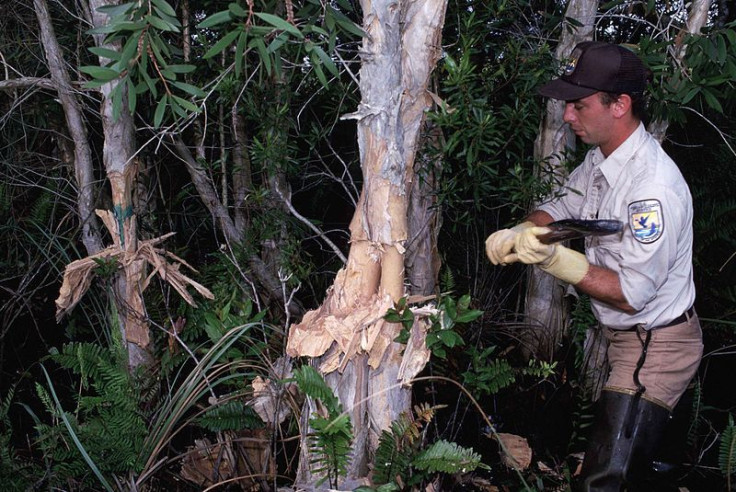Chopping Trees Increases Testosterone Levels More Than Sports; Plus Natural Ways For Men To Boost The Hormone

High testosterone levels are associated with an increase in muscle mass, improved memory and concentration, high energy levels, and a boost in your libido, but for several men, achieving a hormonal balance can prove to be difficult. According to the American Diabetes Association, approximately 13 million men in the United States may have low testosterone levels (low T), with more than 90 percent of them not seeking treatment. Typically, testosterone levels begin to decline by one percent a year after a man turns 30, says Mayo Clinic. The causes for low testosterone levels in men can range from malfunction in the organs that produce testosterone to the inability of these organs to respond to stimulation by the brain.
Sufferers of low T may experience fatigue, depression, and decreased sexual desire, which can interfere with daily activities. Seventy percent of patients use testosterone replacement gel therapy, a lifelong treatment for low T, says the Urology Care Foundation. To naturally increase your testosterone levels, research suggests men should skip the high-intensity sports and start chopping trees.
Chopping Wood vs. Playing Sports
In a study published in the journal of Evolution and Human Behavior, researchers examined testosterone levels in a group of Tsimane forager-farmers in the Bolivian Amazon after playing soccer and also after chopping down trees to clear a jungle for crops. Saliva samples were collected from the Bolivian farmers after they completed both physical activities. Dr. Ben Trumble from the Institute of Social, Behavioral and Economic Research at the University of California, Santa Barbara and his colleagues found that one hour of chopping trees spiked testosterone levels by 48 percent in men of all ages, regardless of their state of health. In contrast, during a soccer game, testosterone levels only increased by 30.1 percent.
Prior to this study, competition and aggression were believed to be the natural boosters of testosterone levels, but now researchers may begin to examine the sex hormone’s roll in the male body. "By focusing so much on the role of testosterone in aggression and competition, we have missed out on the importance of testosterone in a variety of other tasks," said Trumble, reports ABC Science. For Tsimane men in Bolivia, environment plays a bigger role in hormone behavior because they have a lifestyle that requires them to cultivate their own food. The spikes in testosterone levels enhance muscle performance, which improves their ability to cut trees and get food for their families.
Testosterone and Muscle Mass
The Tsimane men’s physically active lifestyle not only boosts their testosterone but also maintains their muscle mass. Trumble believes the ability to maintain muscle mass for men is a tough practice, taking approximately 20 percent of a male's resting energy. While sports competitions have been linked to enhanced muscle performance in men, food production can also yield the same result.
The researchers also compared testosterone levels of American men to those of the Tsimane men (of the same age). While the Bolivian farmers were found to have lower levels of testosterone than U.S. men, they showed less decline in testosterone as they aged. "Even late in life, these men can express the same spikes in testosterone as younger men,” said Trumble.
Natural Ways to Increase Testosterone
If you are not ready to become a lumberjack, or do not like to participate in competitive sports, you can still reaffirm your “manhood” (an association made with testosterone) by boosting the male hormone the natural way. Dr. Mercola offers these top three tips to give you an extra boost:
1. Lose Weight
Shedding the extra pounds has been linked to increased testosterone levels in men, said Mercola. Excessive weight gain can lead to harmful health conditions, such as high blood pressure, obesity, and type 2 diabetes, which are affiliated with low testosterone levels.
2. High-Intensity Peak Fitness Routine
The combination of intermittent fasting and short intense exercise can boost testosterone, unlike aerobics or moderate exercise. Mercola provides an example of this exercise regimen down below:
- Warm up for three minutes.
- Exercise as quickly and intensely as you can for 30 seconds.
- Recover at a slow to moderate pace for 90 seconds.
- Repeat the high-intensity exercise and recovery seven more times.
3. Increase Zinc Intake
The consumption of zinc is important for testosterone production. Taking a zinc supplement can improve low T levels in as little as six weeks. Mercola believes zinc supplementation not only increases testosterone but also protects men from fitness-induced decline of the sex hormone.



























